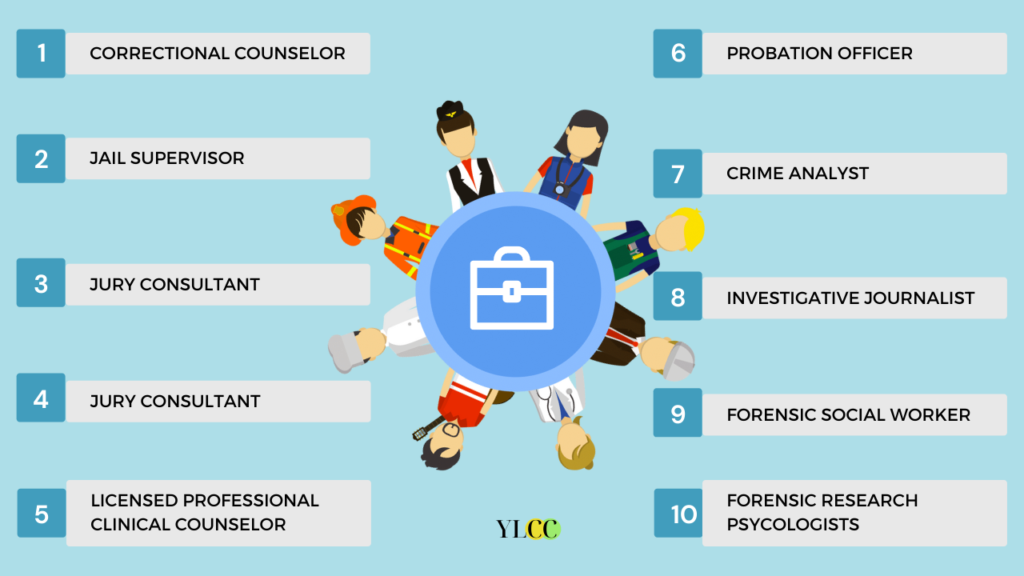
Introduction
Forensic psychology is a branch of psychology that integrates the profession of psychology with law. Those who work in this discipline apply psychological knowledge to the legal system. The term forensic comes from the Latin word ‘Forensis’, which meaning “the forum” or “court”.
According to the American Board of Forensic Psychology, this area involves the application of psychology to issues involving the law and the judicial system. In present situation, there has been an increase in the interest in forensic psychology. A growing number of graduate institutions offer dual degrees in psychology and law, while some provide a specialization in forensic psychology.
While forensic psychology is seen as an extremely new specialist area within psychology, the subject stretches back to the early days. Philosophers and scientists have long attempted to comprehend what motivates people to commit crimes, act violently, or engage in anti-social conduct.
The American Psychological Association (APA) provides a forensic psychology definition of “the application of clinical specialties to the legal arena.” Professionals in the field use psychological techniques, research, and concepts to legal problems. Forensic psychologists are known for their psychological examinations of persons involved in the legal system. They also assist in investigations, perform psychological research, and create intervention programs.
How to Become a Forensic Psychologist
To begin with, one needs to have a bachelor degree in psychology. If the person is from other background, may face some sort of issues while pursuing a master’s or doctorate degree in forensic psychology. There are licensing and non-licensure routes in forensic psychology. If you want to be a licensed counselor, a high-level forensic psychologist, or a professor, you need have a doctorate. In terms of certification, the American Board of Professional Psychology offers a Forensic Psychology Specialty Board Certification. This is not a necessary certificate for forensic psychology practice, but it demonstrates that you have a high degree of proficiency in the discipline. You can obtain an LPCC (Licensed Professional Clinical Counselor) if you wish to work with criminal defendants, sexual offenders, victims, and other legal issues.
Because researchers publish new discoveries on a regular basis, forensic psychology necessitates ongoing education even after obtaining a graduate degree. Throughout your career, you may anticipate attending workshops, training sessions, and lectures to ensure that you grasp the newest discoveries and can apply them to your practice. A license may not be necessary at the start of a profession, depending on where an individual want to practice. However, many states will need it before forensic psychology may be practiced. For example, roughly 17 states need forensic psychologists to be licensed before they may perform competence tests for judicial procedures.

What Skills you need as a Forensic Psychologist?
- Critical Thinking Ability – The capacity to assess and evaluate a situation is an important component of forensic psychology. Every day, professionals must think critically and solve challenges.
- Observational Skills – Forensic psychologists must be able to gather information, process it, and present it to the client, who might be a lawyer, judge, or jury panel. The greater a forensic psychologist’s observation abilities, the better recommendations and conclusions they can give.
- Strong Research Capacity – Whether a forensic psychologist is doing formal and experimental research or cross-checking the formal conclusions of an opposing expert witness, research abilities are required.
- Good Communication Skill – A forensic psychologist has the ability to communicate complicated concepts, which is essential, as much of what they do is explain things to those who do not comprehend a certain psychological notion or theory.
- Understanding of Legal System – Those who work in the judicial system may be taken aback by its intricacy. Forensic psychologists must grasp the fundamental laws, rules, and regulations that govern the legal and court systems, as well as how to operate within those parameters.
- Social Perception – Forensic psychologists frequently work with individuals who are jailed, victims of crime, abused children, and those who have been traumatized. It is essential to be able to interpret and comprehend what others are thinking and feeling but are unable to express.
- Ability of leaving it behind – Because of the nature of the job, it is common to see and hear things that are upsetting. Learning how to leave the work behind and return home to a private life free of those concerns is a necessary skill that forensic psychologists must master early in their careers.
Career Paths as a Forensic Psychologist after a Master Degree:-

- Correctional Counselor – Someone who has a master’s degree in forensic psychology can work at a correctional facility. Forensic psychologists can use their knowledge of crime, punishment, and the legal and psychological consequences of both to fill a number of important positions in the penal system. This might involve providing prisoners and former prisoners with treatment and counseling. Furthermore, forensic psychologists may be involved in the development of programs that aid in the reduction of recidivism rates. Correctional Counselors offer mental health counseling and assistance to prisoners, and they frequently perform both personal and group meetings with them.
Their work may include the following:
- Sessions of counseling
- Conducting psychological assessments
- Collaborating with caseworkers, lawyers, and other correctional facility staff
Correctional counselors can provide greater insights into prisoners’ health and well-being and make suggestions about court appearances.
- Jail Supervisor – Jail supervisors work at correctional facilities such as juvenile prisons, state correctional institutions, and detention camps. Their mission is to keep convicts and staff members safe. Overseeing everyday operations, resolving conflicts, and ensuring the jail is free of contraband are some of the common responsibilities. A good jail supervisor possesses excellent communication and dispute resolution skills. Because it is their responsibility to preserve the peace, it is critical that they comprehend each issue and deal with it conclusively. That is why having a background in forensic psychology may be useful.
- Jury Consultant – Forensic psychologists are needed in a number of court-related roles, including assessing witness accounts, choosing juries, giving consultations, and more. A jury consultant, for example, might assist with lawyers to offer recommendations on which jurors to choose for cases. They conduct extensive study on possible juries and are extensively involved in the voir dire process as advisors. Voir dire is the process through which potential jurors are questioned by both the prosecutor and the defense attorney. Jury consultants also take notes on juror body language and conduct during the trial. This information assists attorneys in planning their strategy and coaching witnesses.
- Licensed Professional Clinical Counselor – Forensic psychology graduates are frequently employed as counselors in a wide range of businesses. Forensic psychology is a flexible discipline that may translate into many various sorts of counseling jobs, from addiction treatment centers to domestic violence shelters to private clinics. In fact, many counseling jobs do need licensure. If you want to become a licensed professional clinical counselor (LPCC), seek for forensic psychology schools that provide a licensure route. This guarantees that you are well-prepared to take the required examinations and apply for licensure.
- Probation Officer – Consider becoming a probation officer if you want to work in the judicial system but in a less visible capacity. Probation officers help in the supervision of persons who have just been released from prison and/or those who have been put on parole. A master’s degree in forensic psychology will assist professionals in making judgments about release dates, assessing the likelihood of hazardous conduct, and counseling previous offenders. Individuals who decide to pursue a job as a probation officer with a degree in psychological health might become key points of contact for those who need help as they seek to do better.
- Crime Analyst – Crime analysts collaborate closely with law enforcement to classify crime profiles and identify criminals. They accomplish this by collecting and sampling data in order to limit crime occurrences in a specific region by providing statistical, strategic, and investigative assistance to the police force. Crime analysts deal with variables such as demographic, economic, and geographic characteristics, which might vary depending on the sorts of crimes and their frequency. In order to carry out their task, they employ tactical tactics, strategic discoveries, and administrative research. These approaches may need specific training and skills––obtaining a degree in Forensic Psychology might provide you with thorough information on how to study statistical data, read and evaluate forensic research, and so on.
- Forensic Research Psychologists – Forensic psychology is essential for investigating various elements of criminology as a researcher. Forensic Research Psychologists do research in a number of areas, including analyzing criminal histories and interrogating suspects, victims, and anyone involved in a crime. They also investigate the circumstances surrounding a specific incident, as well as the age group most closely associated with that crime. The researcher investigates the crime site and documents information that other law enforcement and security professionals have overlooked. Forensic psychologists use the researcher’s knowledge in unusual or difficult situations, and the researcher may also be in charge of compiling and categorizing data for forensic and criminal professional use.
- Investigative Journalist – People with a forensic psychology degree might use their specific expertise to work as a crime reporter or investigative journalist. In these positions, one performs an important and frequently overlooked role in criminal justice and criminology. In many situations, investigations grow too difficult for law enforcement officers and detectives, and investigative journalists may be called in to give extra research and even data documentation for certain cases and crimes.
- Work as Forensic Social Worker – This position combines social care and criminal law expertise to help all parties involved to manage the repercussions of crime. They collaborate with regular social workers to assist individuals who are directly impacted by crime. They act as a connection between the judicial system, law enforcement authorities, and the people that are affected.
Their job responsibilities may include the following:
- Advising on proper therapy and the protection of people accused of crimes and informants
- Assessing the victims mental condition
- Managing witnesses who will be testifying
- Detecting illegal activity among their clients
- Victim Advocate – Many forensic psychologists work as Victim Advocates. Counseling, assistance, and legal representation are provided by psychologists in this position to victims of crime. Victim Advocates assist crime survivors and their families in obtaining safe refuge after a crisis. They also provide survivors with information and preventive methods, as well as continuing assistance before, during, and after court proceedings. When necessary, Victim Advocates recommend survivors and their families to follow-up care.
Conclusion
Over the last few decades, forensic psychology as a subject has made significant advancements across the globe. Its introduction has played a critical role in increasing the efficiency of judicial systems across the world, owing to the fact that everything is done in a methodical and pleasant manner. According to studies, the profession of a forensic psychologist has numerous ethical consequences, particularly for the people they treat and those who rely on their study results to make choices. A profession in forensic psychology necessitates highly skilled individuals with unquestionable morals and emotional intelligence. In recent years, there has been an upsurge in the number of persons studying forensic psychology at colleges and universities. There is an urgent need for the necessary professional organizations and authorities to raise awareness about the profession, as the number of individuals in need of their services throughout the world grows by the day. It is also important to reiterate that a competent forensic psychologist should be well-versed in the law and be up to date on the newest advances in the field by reading research journals from all areas concerned.
YLCC would like to thank Shatakshee Chatterjee for her valuable inputs in this article.






